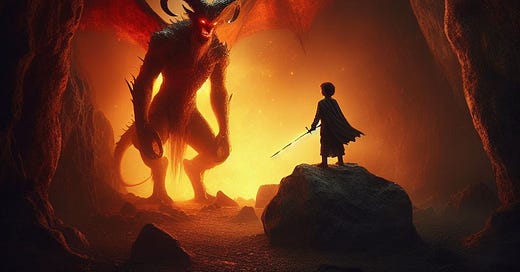I love stories. I love that feeling when I close a book, the credits roll, or the curtain closes, and I feel alive. Have you ever noticed how good stories often end with a wedding? I love that, too.
Anyway, I'm writing about something else today.
Every Writer has looked in the mirror and asked, "Why am I doing this?" (except for vampire romance novelists, though they should).
I certainly do.
I'll think about your kind words about my stories, that's a good reason.
But are we crazy? In the face of everything wrong that happens in the world (an image just came to your mind, yes, that), do these written words mean anything?
I don't have an answer. I say that a lot these days.
The truth is I wish there weren't so many good stories, at least not in real life.
I love stories. As a kid with a tomato stick in the backyard fighting orcs, I wanted life to be an epic story. Now I realize how awful of a wish that is.
Because every good story has a character in conflict. And since conflict is a tired word, I'll say what it really means: suffering. To be a story at all generally means someone is suffering (children's stories are not exempt: The Very Hungry Caterpillar got really sick, Edmund's addiction to Turkish delight enslaved him to a witch, and Charlotte had to save Wilbur's life from the axe multiple times).
I wish stories were relegated solely to pages, screens, and .mp3 files on Apple Podcasts. But they're not. Life, I'm sad to say, is a good story.
It happens daily: dreams die, we lose people, the depression won't leave. How often have you turned on the news and wished you hadn't? "Oh, not again." How many clips on social media did you see today you wanted to unsee?
Suffering is cheap, impartial, and always in stock.
Why do this, write these silly little things?
I don't know.
I just keep on, I guess. That's what the heroes in those stories I love do. Maybe because some of those stories ended with a happily ever after. Some of them ended with so much joy that the heroes looked back at all they'd been through and believed, somehow, it was all worth it.
That's a good story.
But anything with a happily ever after is "just a story, stuff for immature children who don't understand how the world works." I may not verbalize it, but yeah, most days, I believe that.
And then I hear another good story. Rarely is it a new story. Often, it's a beloved one I've pulled down from the shelf, streamed on Hulu, or even just pulled up a clip from YouTube.
I cry during those stories now. I wonder, what is happening in my chest? I can't stand this. Let me be a cynic. Let me be too afraid to hope. Let me have my unbelief. I like to think hope is like chickenpox: once it gets in your system, it never leaves you, even if it doesn't show up for a while.
I don't think we love a good story just because of the happily ever after at the end. We love a story because we see ourselves in it. It is relatable. The happily ever after isn't the relatable part. None of us have achieved that.
The relatable part is the suffering. And that's usually somewhere after the beginning and before the end.
Maybe that's where we are: somewhere after the beginning and before the end.
And if the writers of those stories had quit telling them in the middle, they would have been sad tales. But they didn't. They stayed with those characters and kept writing until they got to the happily ever after, where it was all worth it by the end. And maybe there's a wedding.
I don't think the Writer has stopped telling our story, so I won't either.
Because it's a good one. And you can guess how it ends.
Quick note from Stories Talk Good HQ (it’s a home-office that doesn’t even have quarter round installed at the moment, nothing special). I’m going to be releasing one story a week on Thursdays for a while. I’m trying to learn to do less, even as I tell stories that I hope mean more.






Good stuff, man. Stories are one of those eternal things. We tell them, read them, listen, watch, absorb, consume. But we also live them. One of my favorite bands from childhood, The Early November, got famous for a song called "Every Night's Another Story." It's not a great song, lyrically. But how true is that?